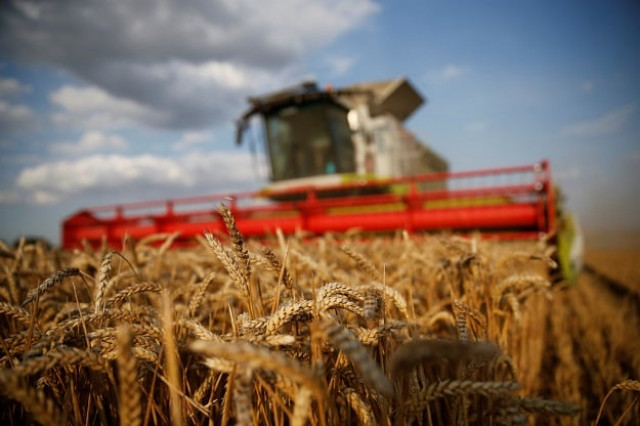Pakistan suffers annual crop losses of up to Rs55 billion
Salinity has rendered a third of the country’s agricultural land unproductive

PHOTO: REUTERS
It is a big problem for Pakistan that has a large agrarian economy as 5.33 million hectares are plagued by salinity and 1.55 million hectares by water-logging.
Crops in Pakistan hard hit due to unavailability of storage facilities: Argentine envoy
“The annual cost of crop losses from salinity has been estimated in the range of Rs15 billion to Rs55 billion,” said Ahmad Jawad, Regional Chairman of the FPCCI Standing Committee on Horticulture Exports, in a statement. He blamed continuous seepage along the irrigation network over the years and a lack of natural drainage that increased the level of groundwater.
Though the government tried to eliminate the problem by installing tube wells and building surface and sub-surface drains throughout the country, its efforts did not bear fruit due to several reasons.
These include costly and energy-intensive drainage and land reclamation approach, which also suffers from practical implications such as environmental degradation and disposal of brackish drainage water.
Jawad pointed out that a study conducted by the UN Food and Agriculture Organisation (FAO) suggested that reforestation of the salt-affected soil was possible with the help of proper site preparation, choice of species and the development of nursery and planting techniques.
However, owing to extensive use of poor quality groundwater, the problem of secondary salinity is growing over an area of around 2 million hectares and it needs a reassessment.
Moreover, he said, “at a national policy dialogue on salt-affected soils, it was stressed that economic utilisation of salt-prone soils with innovative and viable practices, assessment tools and policy interventions is the need of the hour.”
He revealed that almost half of the soil plagued by various types of salinity and sodicity was in Punjab, 40% in Sindh and 9% in Balochistan.
Food security : International moot on sustainable crops
He underscored the need for cooperation between public and private sectors in a bid to convey messages to farmers for improving fertiliser application and ensuring input consumption in a cost-effective and sustainable manner.
Though the US Agency for International Development (USAID) has released $3 million for a three-year project being implemented by the Ministry of National Food Security and Research, International Centre for Agricultural Research in Dry Areas (Icarda) and Pakistan Agricultural Research Council, no benefit could be extended to the farmers so far.
Published in The Express Tribune, July 21st, 2017.
Like Business on Facebook, follow @TribuneBiz on Twitter to stay informed and join in the conversation.


















COMMENTS
Comments are moderated and generally will be posted if they are on-topic and not abusive.
For more information, please see our Comments FAQ